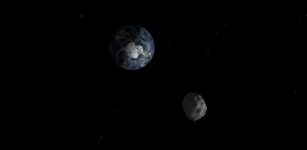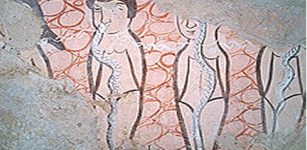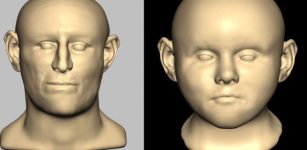René Descartes’ Evil Demon Argument – Can Our Senses Deceive Us?
Cynthia McKanzie – MessageToEagle.com – Born on March 31, 1596 in La Haye, France near Tours, René Descartes is today recognized as one of the greatest philosophers, mathematician, and scientist of all time. His thoughts are still debated, and his legacy is everlasting.
Last time on MessageToEagle.com, we discussed René Descartes’ dream argument according to which there are no definite signs to distinguish dream experience from waking experience.
René Decartes said on several occasions that our senses can deceive us, and he questioned our understanding of reality.
Left: René Descartes (1596-1650) by Frans Hals. Credit: Public Domain – Right: Earth – Credit: Public Domain
Many of his theories and arguments on this matter can be found in his work Meditations on First Philosophy (1641). He never intended his arguments to be taken literally. The examples he provided us with served as a way to express his idea that our senses can play tricks on us and not reveal the truth about the world.
In his Deceiving God and Evil Demon argument, Decartes cast doubt on the reliability of sense perception by suggesting a person can be subject of a massive deception. Descartes pictures the evil demon “as utmost power and cunning has employed all his energies in order to deceive” him.
See also:
Bizarre Strange-Face Illusion – A Scientific Mystery
Free Will Is An Illusion – Says Author Of Your Brain Is A Time Machine
In Higher Dimensions We Could See Past, Present And Future Events Simultaneously
What You See Is Not Real – It’s A Visual Illusion – Scientists Say
“Descartes imagines a scenario wherein he might be deceived by a divinely powerful, but malignant being; a demonic being that could manipulate his thoughts, as God might if he were not supremely good, into thinking anything the demon might choose. This idea of wholesale radical deception has been the subject of popular films such as The Matrix and Twelve Monkeys. Descartes realizes, however, that there is one proposition that neither the evil demon nor even God could ever make false.
This is that at any time when he thinks, it must be the case that he exists. For he must exist in order to be able to think. By such reasoning Descartes is led to the cogito as the one certain, infallible rock of knowledge.” (Stokes, Philip. Philosophy 100 Essential Thinkers)
What Descartes was basically saying was that everything he thinks he do can be questioned. If he thinks he is sitting at the desk writing, he could still be wrong. According to Descarte’s Evil Demon argument a demon intent on deceiving could easily make it appear as if he was sitting at the desk writing, even if this was untrue. His sensory experience of sitting at the desk writing could be caused by an evil demon that is deceiving him.
It does sound very confusing, but Descartes’ theories were rather complex and very philosophical.
Many scientists have opposed Descartes’ ideas because scientific observations and knowledge do come from senses. Those who favor Decartes’ arguments say true knowledge comes only through the application of pure reason.
Decartes’ concept of lack of trust in our sense perception is part of several modern scientific theories. Cognitive scientist Donald Hoffman, University of California stated that he is convinced that evolution and quantum mechanics conspire to make objective reality an illusion. According to Hoffman our world is a conceptual prison and we only see glimpses of reality.
A while back, Laura D’Olimpio, Senior Lecturer in Philosophy, University of Notre Dame Australia put forward an intriguing theory suggesting that our brains are being kept alive in vat of nutrients in a laboratory. D’Olimpio suggested that humans are living in a hologram that is controlled by an evil genius.
If we live in a holographic universe then our perception of reality can be controlled by an unknown force.
D’Olimpio’s theory goes well in line Descarte’s Evil Demon argument. Several quantum physics’ experiments have also given us reason to question the nature of reality. We discussed this subject previously on MessageToEagle.com and explained why and how quantum experiments have revealed that reality does not exist unless we are looking at it.
Some may say that Descarte’s arguments are a bit too old-fashioned for our modern society. However, since Quantum mechanics suggests that we perceive at most a tiny portion of reality, then perhaps René Descarte was not in error when suggesting our senses can be deceived.
Written by Cynthia McKanzie MessageToEagle.com Staff Writer
Copyright © MessageToEagle.com All rights reserved. This material may not be published, broadcast, rewritten or redistributed in whole or part without the express written permission of MessageToEagle.com
Related Posts
-
 Strong Winds Around Black Holes Largely Affect Their Environment – New Study
No Comments | Jan 23, 2018
Strong Winds Around Black Holes Largely Affect Their Environment – New Study
No Comments | Jan 23, 2018 -
 Mysterious Minaret of Jam – Ancient Missile-Like Skyscraper Pointing To The Stars
No Comments | Oct 28, 2016
Mysterious Minaret of Jam – Ancient Missile-Like Skyscraper Pointing To The Stars
No Comments | Oct 28, 2016 -
 Meet The Blob – One Of Nature’s Most Mysterious Organisms
No Comments | Oct 19, 2019
Meet The Blob – One Of Nature’s Most Mysterious Organisms
No Comments | Oct 19, 2019 -
 Afterlife Is Real – Neurosurgeon Says He Has Proof Of Heaven And Advanced Higher Life-Forms
No Comments | Feb 21, 2014
Afterlife Is Real – Neurosurgeon Says He Has Proof Of Heaven And Advanced Higher Life-Forms
No Comments | Feb 21, 2014 -
 Earth May Have Mini-Moons We Haven’t Discovered Yet
No Comments | Sep 7, 2018
Earth May Have Mini-Moons We Haven’t Discovered Yet
No Comments | Sep 7, 2018 -
 Ancient Monastery In The Middle Of ‘Syria’s Stonehenge’ – Underground Caves, Tombs, Stone Circles Older Than Pyramids
No Comments | Nov 13, 2015
Ancient Monastery In The Middle Of ‘Syria’s Stonehenge’ – Underground Caves, Tombs, Stone Circles Older Than Pyramids
No Comments | Nov 13, 2015 -
 Mystery Of The Ashkenazi Jews Found In A Medieval Mass Burial – Solved!
No Comments | Aug 31, 2022
Mystery Of The Ashkenazi Jews Found In A Medieval Mass Burial – Solved!
No Comments | Aug 31, 2022 -
 Rare Fossil Of Dog-Sized Horned Dinosaur From “Lost Continent” Identified By Scientists
No Comments | Dec 6, 2015
Rare Fossil Of Dog-Sized Horned Dinosaur From “Lost Continent” Identified By Scientists
No Comments | Dec 6, 2015 -
 Earth’s Magnetic Field Is Weakening Much Faster Than Expected
No Comments | Apr 17, 2019
Earth’s Magnetic Field Is Weakening Much Faster Than Expected
No Comments | Apr 17, 2019 -
 Earthquakes In Central And Eastern United States Linked To Hydraulic Fracturing Wells
No Comments | Apr 28, 2019
Earthquakes In Central And Eastern United States Linked To Hydraulic Fracturing Wells
No Comments | Apr 28, 2019



